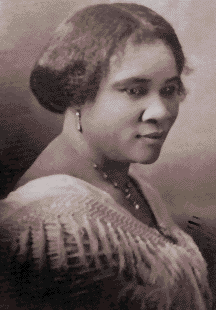Madam C. J. Walker, Entrepreneur, America’s First Female Self-made Millionaire
“I had to make my own living and my own opportunity. But I made it! Don’t sit down and wait for the opportunities to come. Get up and make them.” – Madam C.J. Walker
Like most women, Madam C. J. Walker saw a need and sought to meet that need. Her own adult hair loss prompted her to find a solution that grew far beyond hair tonics to change the way black women maintained their appearance and set the stage for women entrepreneurs around the world. Walker became not only one of the wealthiest black women of her time, but also the first female self-made millionaire.
Madam C.J. Walker was born Sarah Breedlove to former slave parents, the first of their children born free, on December 23, 1867. By the time she was twenty years old, she had been a wife, a mother, and a widow. Walker was a washerwoman until age 33 when her own hair loss encouraged her to create a hair growth product. Formulated on the theory that a clean, healthy scalp would encourage hair growth and prevent hair breakage in women of color, Madam C.J. Walker’s Wonderful Hair Grower sought to not straighten, but strengthen hair. Walker peddled jars of her product—featuring her own “before” and “after” likenesses–door-to-door.
Before companies such as Avon or Mary Kay got their start, Walker was creating what she called a Beauty Culture for black women, teaching them how to care for their personal appearance. When support roared in for her products, Walker created a correspondence school to train women in the The Walker Method of Hair Culture. The course taught women in three areas: how to present oneself as clean, well groomed and professional; how to use the Walker products on customers; and how to sell Walker’s products.
Walker gave black women the power to earn an independent living, as well as belief in their own beauty and abilities. Considering the time in which she built her business—on the heels of slavery and pre-civil rights movement, Walker brilliantly waltzed past the landmines created by being a woman and black.
As her business continued to expand, Walker moved the correspondence school and to Indianapolis, Indiana where she also constructed a manufacturing facility for her product lines and built her home next door. Within a year of her move, Walker had incorporated her business as The Madam C.J. Walker Manufacturing Company where she was the President an only stockholder.
Walker was a master at reaching her target audience. In addition to marketing her products in black newspapers and drug stores, she also toured the country to spread knowledge of her system. She stayed hands-on at her company even while away by reportedly mailing letters to her General Manager instructing him how to operate the business in her absence. Walker was not only an example to black women; she was an example to all people. Her philanthropy knew no bounds, and she readily donated to local causes.
Walker was able to expand her business across the country and into Central America and the Caribbean through her Walker Agents, the army women she trained to teach about and to sell her products. Walker held special events to recruit and train the Walker Agents, and instituted a National Convention for Walker Agents with prizes and incentives to motivate them to sell more. Her multilevel marketing methods will sound familiar to anyone who has seen women’s cosmetic and skin care giants such as Mary Kay in action lately—think product promotions and sales bonuses.
Madam C.J. Walker died in 1919, but her legacy lives on in The Walker Theater Building in Indianapolis, and in The Madam C.J. Walker Company, now under new ownership, that still manufactures and sells her beauty products online today.
Walker’s life and business are a testament to every woman’s ability to identify a need, address it, and become a history-making entrepreneur. Walker said, “I had to make my own living and my own opportunity. But I made it! Don’t sit down and wait for the opportunities to come. Get up and make them.” She did it all without benefit of computers, internet, or smartphones. Tomorrow morning when you wake up thinking, “I wish I had an App to…. Or a product to do…,” think of Madam C.J. Walker and know there is nothing in the world that can stop you from making that product a reality.
13 Interviewer Interview Prep
Interviewer Interview Prep Impactful Mentees
Impactful Mentees Benefits of a Mentor
Benefits of a Mentor Advice for First-Time Managers
Advice for First-Time Managers Overcoming the 18-month Itch
Overcoming the 18-month Itch Dressing for Your Style
Dressing for Your Style Interview Style Tips
Interview Style Tips Women's Stocking Stuffers
Women's Stocking Stuffers Gift the Busy Traveler
Gift the Busy Traveler Father’s Day Gift Guide
Father’s Day Gift Guide Airport Layover Activities
Airport Layover Activities Traveling & Eating Healthy
Traveling & Eating Healthy Travel Like a Boss Lady
Travel Like a Boss Lady The Dual California Life
The Dual California Life Gifts for Thanksgiving
Gifts for Thanksgiving Summer Reading List
Summer Reading List Top Leisurely Reads
Top Leisurely Reads New Year, New Books
New Year, New Books Life Lessons from a Sitcom
Life Lessons from a Sitcom Oprah, Amy or Amal?
Oprah, Amy or Amal?






